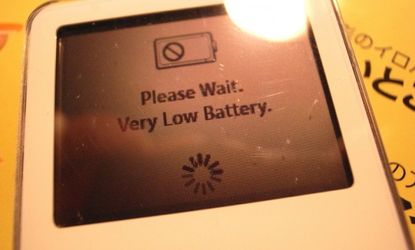The search for a better battery
The limitations of 20th-century batteries are holding back technological progress. Is a breakthrough in sight?

What's the state-of-the-art battery?
The lithium-ion battery, which powers everything from the cellphone in your pocket to airplane flight systems and electric cars. Li-ion batteries have been used commercially since 1991, and there are more than 1.8 billion of them in use. Their capabilities have helped lead to huge advances in digital technology: They recharge within hours, can keep portable electronics going for days, and yet are small enough to fit inside pocket-size devices. But most Li-ion batteries produce levels of energy too low to power large machines and expire within three years. While a single cell is enough to power an iPhone, airplanes and cars need to be stocked with rows of batteries. Such large arrays can overheat and burst into flame, like the 63-pound battery pack that caused a fire inside a Boeing 787 Dreamliner earlier this year. Many engineers believe the Li-ion battery's performance has been stretched about as far as it can go. "We need to leapfrog the engineering of making batteries," said Vince Battaglia, a battery scientist at Lawrence Berkeley National Lab. "We've got to find the next big thing."
What do engineers need a new battery to do?
Subscribe to The Week
Escape your echo chamber. Get the facts behind the news, plus analysis from multiple perspectives.

Sign up for The Week's Free Newsletters
From our morning news briefing to a weekly Good News Newsletter, get the best of The Week delivered directly to your inbox.
From our morning news briefing to a weekly Good News Newsletter, get the best of The Week delivered directly to your inbox.
Recharge more quickly, store more energy, and discharge it for longer. The limitations of our current technology are most apparent in batteries for electric cars, which run out of energy every hundred miles or so and take up to four hours to recharge, yet cost as much as $15,000 each. "The lack of affordable, highly functional batteries has been a particularly high barrier to the widespread adoption of electric cars," said a 2010 Department of Energy report. But a significant improvement in battery technology would boost more than electric vehicles — it could help sustainable energy overtake nuclear and fossil fuels by allowing the power produced when the wind is blowing and the sun is shining to be stored for times when the wind and sun aren't cooperating. "If you crack it," said Jay Whitacre of Carnegie Mellon University, "it'll change the world."
What's the likeliest candidate?
A lithium-air battery is the "best chance battery scientists have to beat gasoline," said Seth Fletcher, author of Bottled Lightning, a book about lithium technology. An ordinary Li-ion battery contains electrodes of carbon and a lithium compound. A Li-air battery would effectively use atmospheric oxygen as an electrode, rather than pure carbon, providing much more energy intensity. There are still several vexing obstacles to Li-air batteries — not least the fact that pure lithium is explosively reactive with water in the air. IBM is one of several companies trying to build one, but the technology is said to be in its infancy. Other researchers are exploring metallic alternatives to lithium, such as magnesium.
How would that work?
Sign up for Today's Best Articles in your inbox
A free daily email with the biggest news stories of the day – and the best features from TheWeek.com
Magnesium has more reactive electrons than lithium, meaning it could theoretically store much more energy. But it's very difficult to get magnesium to release those electrons inside a battery. Toyota said last year that it had conducted "positive" early tests on a magnesium-tin battery, but said it was still a decade away from commercial development. ZPower, a California-based start-up, created a working power cell that runs on silver and zinc, but it could not match the voltage of a similar-sized Li-ion battery. None of these alternatives has yet edged ahead of the pack. "Right now it's a horse race," said George Blomgren, a former researcher at Eveready. "There's deficiencies in every technology that's out there."
Is the government helping the research?
It's trying to. In the president's first term, the Obama administration invested $2.4 billion in 29 private firms working on power cells for electric cars. But many of those firms have struggled financially because they haven't made progress they can bring to the market. Battery-maker A123 filed for bankruptcy last year, having received $249 million from taxpayers. Undeterred, the Department of Energy invested $120 million last year in the Joint Center for Energy Storage Research, a partnership among five national laboratories, five universities, and four private firms to push forward battery technology in the U.S. Then–Energy Secretary Steven Chu pledged that JCESR would create batteries five times more powerful and five times cheaper within five years. Not everyone believes the project will succeed. "This is the definition of a money hole," said energy analyst Rob Enderle.
Is five years unrealistic?
History would suggest so. Advances in battery technology tend to happen incrementally. Since French physicist Gaston Planté invented the first rechargeable battery 154 years ago, battery performance has improved only eightfold. Modern electronics function so well only because improvements to silicon-chip technology enable them to use available electric power much more efficiently. Planté's breakthrough, not incidentally, was the lead-acid battery — technology that is still in use today in hundreds of millions of automobiles. Its staying power is a "remarkable testament to first how robust that chemistry is, and how difficult change is," said Whitacre. But researchers on a quest to build a better battery can take comfort from the words of Thomas Edison, who discovered the nickel-iron battery in 1901. "I don't think nature would be so unkind as to withhold the secret of a good storage battery," Edison said, "if a real earnest hunt for it is made."
Graphene supercapacitors
When progress comes, it can look almost like an accident. Last year UCLA chemistry student Maher El-Kady figured out a way to use the laser in a cheap DVD burner to produce graphene, a carbon material that has extraordinary electrical properties, but is notoriously expensive to manufacture. Using sheets of graphene manufactured by El-Kady's method, a UCLA team has since made a highly efficient supercapacitor — a device that stores energy like a battery, but recharges up to 100,000 times more quickly. They're now working on commercial applications that could one day find their way into cellphones or even electric vehicles. Richard Kaner, El-Kady's supervisor, said that while the breakthrough was a surprise, it built on years of experiments. "Nothing in science is actually an accident," he said. "It only looks that way when you look back."
Create an account with the same email registered to your subscription to unlock access.
-
 'Elevating Earth Day into a national holiday is not radical — it's practical'
'Elevating Earth Day into a national holiday is not radical — it's practical'Instant Opinion Opinion, comment and editorials of the day
By Harold Maass, The Week US Published
-
 UAW scores historic win in South at VW plant
UAW scores historic win in South at VW plantSpeed Read Volkswagen workers in Tennessee have voted to join the United Auto Workers union
By Peter Weber, The Week US Published
-
 Today's political cartoons - April 22, 2024
Today's political cartoons - April 22, 2024Cartoons Monday's cartoons - dystopian laughs, WNBA salaries, and more
By The Week US Published